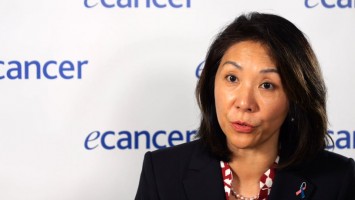Glofitamab is a CD20/CD3 bispecific T-cell engaging antibody. It has a special format, 2:1 format, with
two molecules that bind CD20 and one that binds CD3 which we think may contribute to its potency.
It’s given intravenously and we’ve evaluated it in a phase I study. Then what we’ve presented here
are the expanded pivotal results of its use in diffuse large B-cell lymphoma.
What was the methodology behind this study?
This study began as a phase I dose escalation study. We initially dosed patients in cohorts 1 and then
3 and then it’s had a number of arms exploring the application of this bispecific antibody across the B-
cell lymphomas. What we’ve presented at ASCO and EHA are the results of a pivotal study once
we’ve established the phase II go-forward dose which is 30mg given once every three weeks for
twelve cycles after an initial two dose step-up. So we give obinutuzumab as pre-treatment, an anti-
CD20 antibody, followed a week later by 2.5mg of glofitamab, followed a week later by 10mg and then
30mg out to twelve cycles; we give the 30mg every three weeks. So a fixed course treatment,
intravenous, two-step step-up, obinutuzumab pre-treatment.
That has been applied to a population of patients with relapsed and refractory large B-cell lymphoma
after two prior lines of therapy. We’ve presented 154 patients; 30% of those had previously received
CAR T-cells and this is one of the first times we’ve presented that data. We saw a 39.4% complete
remission rate which is quite striking in a population in which 80% had been refractory to prior
therapies. The vast majority had been refractory to their immediate prior therapy; those patients who
had had CAR Ts had been refractory to the CAR Ts and yet this drug, which activates T-cells, was
able to induce these complete remissions. We showed that the vast majority of patients retained
those remissions at 12 months in spite of stopping treatment at nine months.
We also presented patients who had been treated below the phase II go-forward dose, just to see
how durable these remissions were. We looked at all patients who met the same inclusion criteria, so
relapsed/refractory large B-cell lymphoma, two prior lines of therapy who had received at least 10mg
of glofitamab but less than the phase II go-forward dose. The complete remission rate in that
population was around 35% and we saw that we could follow patients out to three and four years and
they would retain their remission.
It’s pretty striking to be able to give a fixed duration treatment that stops at nine months and have
people retaining their complete remissions beyond twelve months. In the aggressive lymphoma
setting we’re very hopeful that that will translate, with time, to confidence that this drug can cure
patients. That’s important because it’s an off-the-shelf treatment, it’s immediately available, you don’t
have to wait for manufacturing, it’s deliverable with a manageable toxicity profile. We’ve seen cytokine
release syndrome as the main toxicity but that appears to be very manageable and very predictable.
So we think that this will translate into usefulness for patients and physicians and I can see
glofitamab, and drugs like it, becoming part of routine care in B-cell lymphomas. The question going
forward is what next?
What is next for the study?
The study itself has explored other histological subtypes; we’ve reported mantle cell lymphoma and
follicular lymphoma. The next thing is there’s a range of combination trials that are being done by the
sponsor, which is Roche. The bispecific antibodies lend themselves to combinations and there are
combinations exploring additional agonists of T-cell function as well as studies exploring combinations
with conventional chemotherapy. Indeed, there’s a randomised study running in the second and
subsequent line at the moment exploring the addition of glofitamab to chemotherapy. Indeed, there
are studies exploring the addition of glofitamab in the front line in combination with either R-CHOP or
R-CHP polatuzumab that are already recruiting patients around the world.








